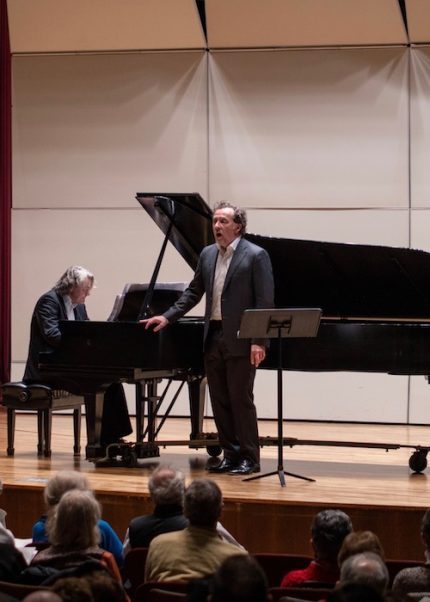Gerhaher and Huber illuminate the darkness in an evening of Mahler songs

Art song touring programs tend to be mix-and-match affairs: a little Handel or Mozart to warm up, a main course of Schubert or Schumann, and some brief, light 20th- or 21st-century fare to end on a cheerful note.
None of that happened Friday night at the University of Chicago’s Mandel Hall. Rather, baritone Christian Gerhaher and pianist Gerold Huber presented an evening devoted entirely to songs of Gustav Mahler—repertoire infrequently heard in Chicago and rarely presented anywhere in a single program.
While Mahler’s epic symphonies have become among the most popular of orchestral repertoire over the last half-century, his songs are performed less often these days. That’s likely due as much to the decline in popularity of the art song recital generally than to any lack of favor for Mahler’s lieder, dark and tragic as they tend to be.
That’s unfortunate because Mahler’s songs are as essential a part of his oeuvre as his orchestral works. Indeed, the human voice is a crucial part of five of his completed ten symphonies (including Das Lied von der Erde, his symphony/song cycle); there is a crucial nexus between the genres with Mahler often drawing upon his songs for thematic material in his symphonies.
Gerhaher and Huber framed their UChicago Presents program with two of Mahler’s cycles, the centerpiece reserved for a selection of songs from Des Knaben Wunderhorn.
Gerhaher possesses a firm middleweight baritone, dark in hue with striking flexibility and clarion top notes. As heard Friday, his voice doesn’t possess a wide range of expressive colors. That may have been partly due to the fact that he appeared to be suffering from a cold—employing a handkerchief at times and sounding rather dry of tone in the early going.
But even with that, Gerhaher’s singing was technically assured and immaculate in intonation almost throughout. Most crucially he is a richly idiomatic Mahler singer and a consummate musical storyteller, with a natural, informal style well suited to these strange and haunting settings.
Huber, his longtime recital partner, displayed keyboard artistry on the same high level. Their close-knit musical collaboration was so natural as to seem almost symbiotic and effortless.
The evening led off with Lieder eines fahrenden Gesellen (Songs of a Wayfarer), the earliest of Mahler’s four cycles.
In “Wenn mein Schatz Hochzeit macht” (When my darling has her wedding day), Gerhaher conveyed the melancholy of the discarded lover—Huber’s angular piano notes like jabbing darts of psychic pain—contrasted with a brief happy moment in the middle section. The baritone brought a hearty, animated expression and leaping top notes to “Ging heut’ morgen übers Feld” (I walked across the field this morning), outdoor music mined for the main theme of the opening movement of Mahler’s First Symphony. Here as throughout both men subtly underlined Mahler’s progressive tonality, as with the shadow cast by the turn into the minor in the pessimistic concluding stanza.
The singer brought an almost unhinged intensity to “Ich hab’ ein glühend Messer” (I have a red-hot knife), starkly conveying the protagonist’s inveighing against the woman who betrayed him and longing for death. Likewise in the concluding song “Die zwei blauen Augen” (The two blue eyes of my darling). Gerhaher’s conversational style reflected the text’s stoic sadness, with Huber’s dirge-like piano tread amplifying the man’s wish for the peace and solace of the grave.
A generous helping of ten songs from the Des Knaben Wunderhorn collection were spread across either side of intermission; Gerhaher’s voice sounded stronger and more focused after the break.
Standouts among these were the playful fable-like “Wer hat dies Liedlein erdacht?”, the black grotesque humor of “Ablösung im Sommer,” and the lovely waltzing “Rheinlegendchen.” In the “Lied des Verfolgten im Turm” (Song of the persecuted man in the tower) Gerhaher subtly shifted his coloring to reflect the perspectives of the prisoner and his beloved. The military songs proved especially powerful, not least “Wo die schönen Trompeten blasen” (Where the beautiful trumpets blow) with Gerhaher’s gripping account inhabiting the tale of the soldier facing death, set against Huber’s atmospheric keyboard trumpet calls.
The program concluded with the Kindertotenlieder (Songs on the death of children). Gerhaher and Huber brought a deep dedication to these devastating songs yet always with a terraced expression that avoided the easy emotions.
In “Nun will die Sonn’ so hell aufgeh’n” (Now the Sun will rise as brightly) Gerhaher and Huber underlined the elegiac nocturnal expression. So too in “Wenn dein Mütterlein” (When your mother) the duo conveyed the subdued heartbreak of the protagonist seeing his dead daughter’s visage appear on the doorstep.
The fruitless hoping of “Oft denk’ ich, sie sind nur ausgegangen” was quietly wrenching as the parent hopes against all signs that his missing children will return. Gerhaher charted the stark emotions of the concluding “In diesem wetter (In this weather) raging against the children being taken out in a storm and then fluently moving to a quiet reluctant acceptance in the final stanza (“They will be frightened by no storm again and are covered by the hand of God”). Huber’s poignant postlude closed the program most affectingly.
Repeated ovations brought Gerhaher and Huber back out for a single encore (following a strange incoherent acclimation shouted from a balcony patron).
What better way to end a program of bleak lieder than with Mahler’s “Urlicht” (Primal Light)? The baritone brought to the Wunderhorn song (famously used in his Second Symphony) a glowing, introspective rendering, providing a small ray of hope at the end of a dark evening.
The program will be repeated 7:30 p.m. Tuesday in New York at Lincoln Center’s Alice Tully Hall.